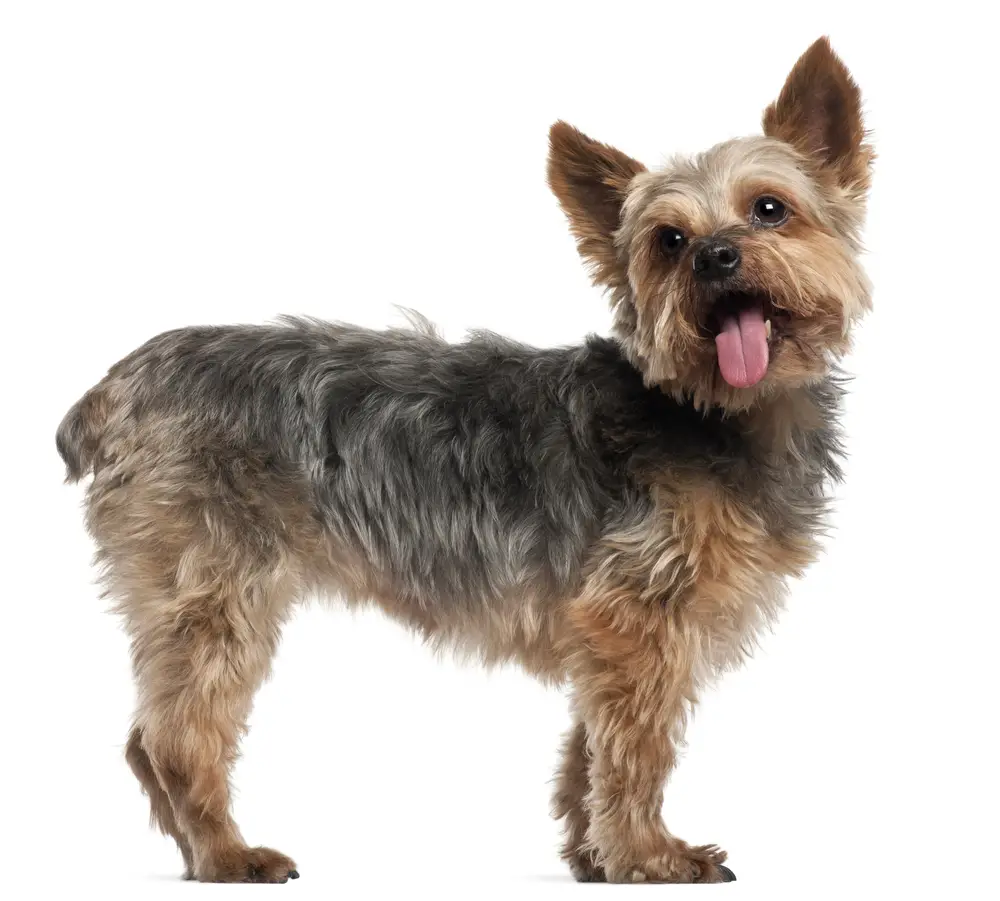House Training Your Yorkie
House Training Your Yorkie
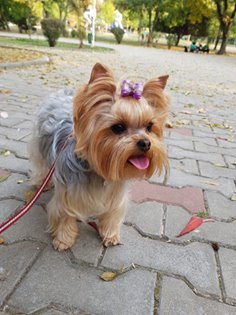
Mufi – Courtesy of Roxana Dumitru
House training a Yorkie can be a lot easier than certain other breeds. Energetic, high tendency to bark, affectionate, and, above all, domineering: these are just some of the characteristics you can expect from these feisty little pups. Ready to begin the journey of potty training a Yorkie puppy? Before we start, take the following things into consideration:
- Yorkshire Terriers have a reputation of being hard to potty train but that’s because they’re stubborn, not a lack of ability or intelligence. With such small bladders, they won’t last long. You can generally expect a two-month-old puppy to last around two hours, a three-month-old to last three, and so on. As a puppy, Yorkies won’t yet have full control over their bladder and bowel muscles. So be prepared.
- Don’t expect a trailblazer. Yorkies are much more content to be carried around in the great outdoors in their formative years. Housebreaking a Yorkie means you can’t give in to their desire to be carried everywhere.
- Expect a barker! Despite their small stature, Yorkies are notoriously eager to enunciate. The upside is that they make for excellent watchdogs. Your pup will probably bark a lot at night and you’ll need to figure out if they really need to go or need to be ignored. The barking can, however, be moderated with sufficient training and exercise.
- Make sure to adhere fully to the rules laid out ahead. In this case, rules are not made to be broken. Strict adherence will yield optimal results so you won’t be left with messy carpet for the rest of your days.
While at times their stubbornness may prove challenging, they’re also very intelligent ant can learn easily as long as you follow these steps
So, without further ado, here’s the definitive guide to potty training a Yorkie with everything you should know to get started and succeed.
How to Potty Train a Yorkie
Step #1: Designate the bathroom area
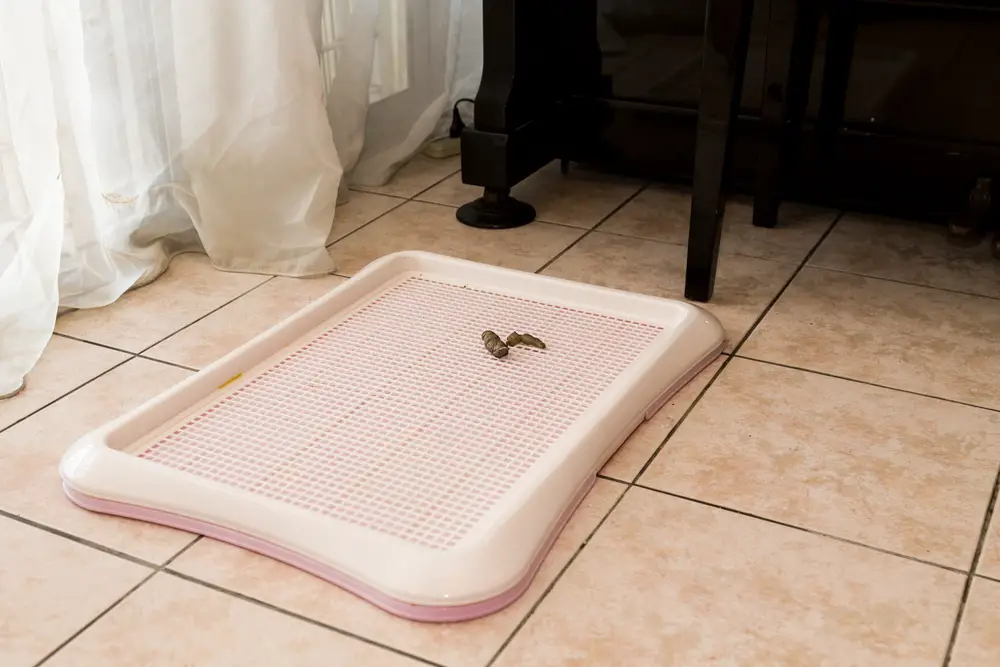 This is the easy part. But wherever you choose, you should be the one to bring your pup to this location rather than just opening the door and letting it loose. Not only will there be nothing for your puppy to learn, it’s also potentially quite dangerous out there for such a small and adventurous pup.
This is the easy part. But wherever you choose, you should be the one to bring your pup to this location rather than just opening the door and letting it loose. Not only will there be nothing for your puppy to learn, it’s also potentially quite dangerous out there for such a small and adventurous pup.
You’ll want to find an area that, whatever the weather, is going to be fully accessible and no fewer than 10 feet away from any areas you will want to be using yourself. This is the last kind of present you want to be brought to any family get-togethers, or near any food.
Step #2: Make sure your Yorkie is supervised

Bruno, Charlie, Tiny Courtesy of Leslie Wilson
Perhaps the greatest contributor to a failed housebreaking is when owners get lax with supervision. Everything’s fine, you go answer the phone and before you know it, there’s a nice gift on the rug waiting for you. It is not enough just to glance over from time to time to make sure everything is ok. You need to be on hand at all times, ready to pick up your pup at the first sign of a motion, and carry them over to their designated area. This is an area of potty training a Yorkie that’s easy to forget.
Should you not be able to keep your eyes trained to them 24/7 (you probably need to eat sometime), there’s one of two things you should be doing.
For those times where the dog can’t be by your side, an appropriately sized playpen is the best way to keep the pup where you want them. The IRS 4-panel pet playpen is a good choice because it gives your Yorkie room to play and it confines any accidents to one area. Giving your Yorkie an entire room shut off by a gate is not recommended. Unless properly puppy proofed, this can be dangerous in more ways than one. You can expect any items in the room to be thoroughly chewed. Also, your Yorkie will see to it that all of its bathroom habits will be spread all the room.
If you are able to keep them by your side, keep them tethered with a short, lightweight leash, no longer than 6 to 9 feet. It’s essential, however, that you use a harness, not a collar. Since they’re still young and fragile a collar can potentially cause a neck injury. Yorkies are very prone to a collapsed trachea, even as an adult. Choose a soft harness that won’t tug against their throat like this Pupteck no-pull harness.
Step #3: Set up an enclosure or containment area
Choose a good spot in the room that is still within distance of the family. We don’t want the family’s newest member feeling lonely. If you’re placing the pen onto carpet or hardwood, you may want to lay down something protective to make the base.
Within the pen you’ll want the following: a nice, comfy bed (we like this Deep Dish snuggler dog bed), food, water, potty pads (maybe kept in place using an empty litter box, to prevent them from being moved or chewed) and some toys like teether chews. The toys will encourage teething, and with any luck keep the furniture safe.
Step #4: Give praise for using the bathroom area
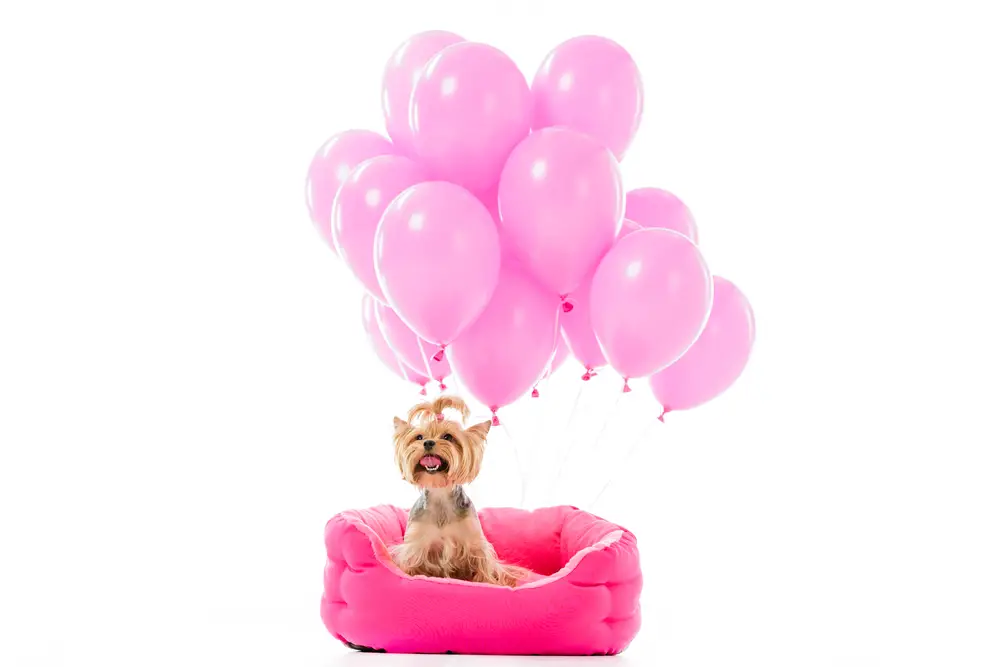 As has always been the case with us humans, the best way to get a dog to do anything is with ample praise and reward. After all, what else will keep them motivated to make an effort and do as you say? Always reward your Yorkie with a treat after going to the bathroom in the correct place. The treat should be small like these Wellness puppy bites because they should be getting many treats every day. And the next time you go out, place them again in the exact spot.
As has always been the case with us humans, the best way to get a dog to do anything is with ample praise and reward. After all, what else will keep them motivated to make an effort and do as you say? Always reward your Yorkie with a treat after going to the bathroom in the correct place. The treat should be small like these Wellness puppy bites because they should be getting many treats every day. And the next time you go out, place them again in the exact spot.
Make sure to be prompt when giving praise. If you do it immediately, verbally as well as with treats, this will be taken as a sign of doing the right thing and your Yorkie will keep in mind the lesson. If you wait too long to give praise, your puppy won’t associate the praise with their action.
Step #5: How to react to accidents
It’s important not to lose your temper or scold your Yorkie if they have an accident. In time, this could lead to a more fearful relationship. Instead, if you witness your Yorkie starting to relieve itself, intervene with a loud clap and a strong, firm “No.” Take the pup straight to the area you have designated for it and allow it to do its business. Accidents will happen, so you must stay patient and persistent.
If the deed has already been done and you happen upon it, consider what you may or may not have done to lead this to happen. Were you following the previously mentioned confinement and supervision methods? Scolding or yelling at your Yorkie will do absolutely no good, and will only lead to it becoming fearful of you.
As mentioned earlier, Yorkies have notoriously small bladders, especially as a puppy, so be prepared for accidents.
Important Tips for Potty Training Your Yorkie
Here’s some tips to help with housebreaking a Yorkie as quickly as possible.
Be patient and give your pup at least 15 minutes outside

Bossy Courtesy of Ruth Martin
If you take the pup straight back inside or straight into his pen after he goes potty outside, this may be taken as a sign of punishment. Be sure to give the dog ample time to enjoy the outdoors. An important element of how to potty train a Yorkie is also allowing him enough time to actually go. Sometimes it takes a while for the urge to strike!
Establish regular meal times
Regular meal times will be a huge help in trying to predict when your Yorkie will need to go for a visit to the great outdoors. Always feed your pup at the same time each day, and then take them out around 15 minutes later.
Take your pup to the same designated potty area every time
As discussed earlier, always take your Yorkie to the same area each time they need to go. It may help to stand dead center of the area, and let them choose a position within a certain radius of you. Choosing their own spot within the area will teach them a degree of independence and make them feel more comfortable and eager to go.
Take your Yorkie outside every time you see them moving to potty
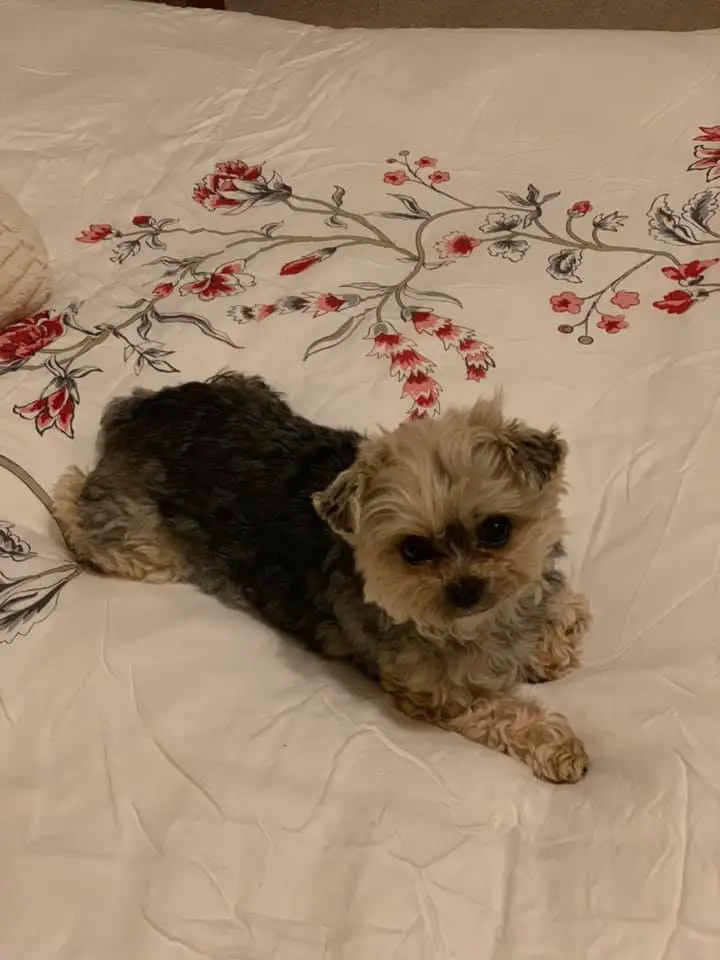
Peanut Courtesy of Mary Drew
Since you’ll be keeping such a close eye on your Yorkie, you can be prepared to take them outside at the first signs they’re about to go. A firm “No,” a clap, and picking them up will immediately make them cease. You can then promptly take them outside to their designated area.
Make sure to take your Yorkie outside regularly
You don’t want the poor thing locked up in the house all day. Generally speaking, you should be sure to take them outside at the following times:
- Right after they’ve woken up
- If you’ve been out, right after you arrive back home
- Roughly 15 minutes after each meal
- Roughly every 3 hours for a three month old, 4 hours for a four month old, 5 hours for a five month old and so on.
- Right before bed
Know when to respond to barking
Yorkies love to bark. If your Yorkie is barking through the night is important to determine whether this is due to it needing to go to the bathroom or if it’s just doing it for fun and attention. For most young pups there’ll be a reason for wanting to get your attention, even if it’s just for affection. Unless your puppy seems like they need to go urgently, ignore the barking.
Never punish your Yorkie
It bears repeating: your Yorkie knows when it’s done wrong, and will not have done so intentionally. Punishing your Yorkie, verbally or otherwise, will only serve to make it fearful of you. Use praise when potty training a Yorkie, not punishment.
Why You Shouldn’t Stick with Potty Pads
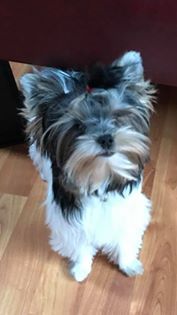
Molly Courtesy of Lesley Houser
As helpful as potty pads can be in the early months of your pup’s life, it’s not recommended to rely on them long term. To begin with, they aren’t exactly the most glamorous things to have lying around the house. And if trained on them for too long, your pup will get used to the idea of going inside. You’ll want to wean them off of these as soon as is possible.
Also, things like welcome mats, bath mats, or even the game of Twister you’ve got family over playing can, due to their similar shape and appearance, become confused in the pup’s mind for a place to go relieve themselves. Right hand yellow could be about to take on a whole new meaning…
Common Yorkie Training Problems
So you’ve taken your Yorkie outside and they seem to have done just about everything besides going to the bathroom. Well, maybe they just didn’t need to go. It’s more important to give your Yorkie the option to go, whether it needs to happen or not.
Often times, though you may think your Yorkie just didn’t need to go, they will immediately relieve themselves after coming back in the house. In most cases, your Yorkie probably just wasn’t given enough time to go outside. It can take upwards of 15 minutes for the pup to relax itself and let its bowel muscles do the work. If you’re hurrying to get back in, maybe due to inclement weather, perhaps a coat or vest for the little one will do the trick or even an umbrella leash attachment for your pup. Try to consider why your pup is going potty inside to address the problem.
It’s important to remember that until your pup is 100% fully house trained, you should not give him full reign of your home.
How to Handle Your Yorkie’s Incontinence
Urinary incontinence can happen in dogs that have otherwise been fully house trained and able to wait. While often it’s the case that incontinence can come with age, there are many other possible causes that shouldn’t go unconsidered such as:
- Bladder infection
- Hormonal imbalance
- Excessive drinking
- Kidney disease
- Side effects of certain medications
- Spinal injury
- Prostate disorders
- Digestive problems
If your Yorkie is suffering from urinary or bowel incontinence or he is having a major setback after becoming house broken, you should consult with your vet. It may not be an issue of training. In most cases, it will be straightforward and easily treatable. 90% of dogs that suffer with incontinence will respond to medical intervention. It could even be as simple as taking your Yorkie on more frequent walks but it’s important to rule out a serious health issue.
Some cases of urinary incontinence come and go, others can progress and cause more serious infections to the kidneys and bladder. Skin infections may also be a consequence of areas that are in constant contact with urine.
Depending on the cause, treatment can come in one of a number of ways. Medication can often manage the condition effectively and prevent day-to-day accidents. Hormone therapy could be an option, or in more serious cases surgery may be required. Recent tests have even shown collagen injections to have promising results.

